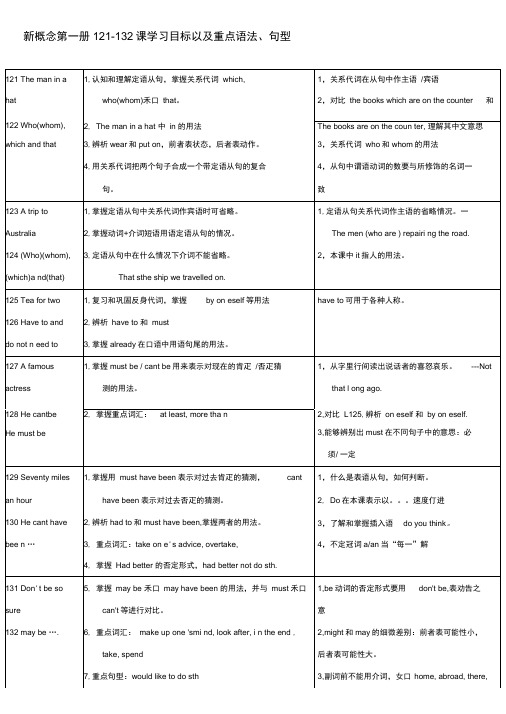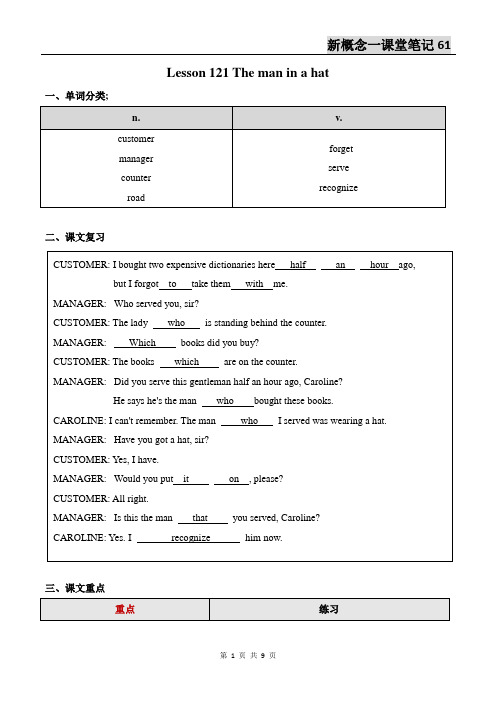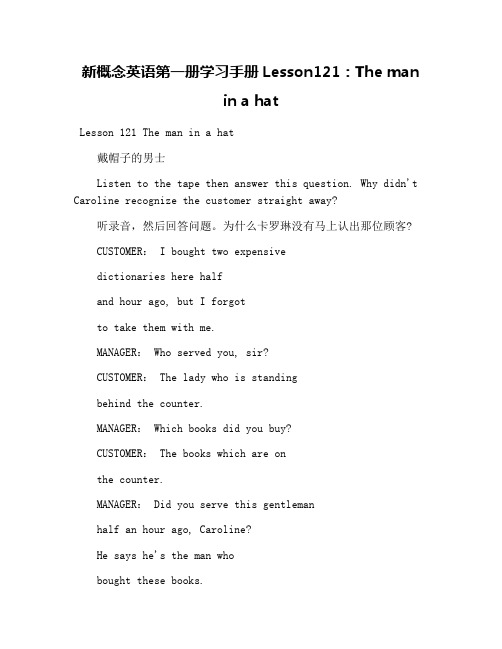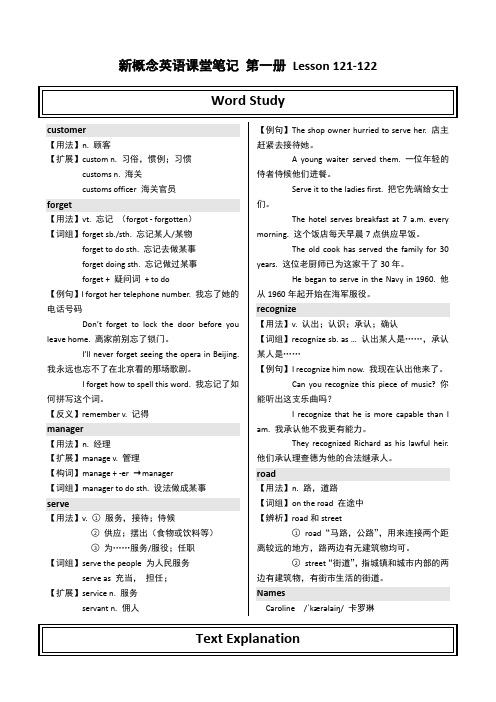新概念英语第一册第L121复习进程
新概念英语第一册Lesson123~128自学笔记精讲解析

新概念英语第一册Lesson123~128自学笔记精讲解析新概念英语第一册Lesson123~124自学笔记精讲解析1.What a beautiful ship!多漂亮的轮船啊!what引导的感叹句通常是由 What + a(n)+形容词+名词构成的。
2.That’s right.对。
这句是对上面附加疑问句的回答。
上面一句虽用否定形式提问,但回答则根据事实来决定是用肯定或是否定形式。
That’s right是肯定的回答,相当于Yes, it is(那正是我)。
3.grow a beard,留胡子。
4.shave it off,把胡子刮掉。
it指 a beard。
5.定语成分standing behind the counter和 repairing the road 是现在分词短语,作后置定语,分别修饰 The man, The woman 和The men。
I served yesterday 和I saw yesterday 是定语从句,分别修饰the man, the woman和the men。
此处关系代词 whom 省略了。
I bought yesterday和I found in the garden是定语从句,分别修饰 the book, the books和 the kitten。
关系代词 which或 that 省略了。
新概念英语第一册123-124课语法知识点 Grammar in use定语从句中的省略当关系代词代表主语并且从句中的谓语动词是(现在)进行时态时,关系代词及助动词be均可省略。
如果关系代词在从句中代表宾语,则往往可以省略。
此外,定语从句可用介词结尾。
请分别看以下的例句:The woman standing behind the counter served me.站在柜台后边的那位妇女为我服务/招待了我。
This is the book I bought yesterday.这就是我昨天买的那本书。
新概念英语L121-122教案

新概念一教案L121-L122 1Lesson 121 The man in a hat一.教学目标:了解并掌握过去完成时的用法二.教学导向:①重点词汇:1.forget②重点句型:1.forget to do / doing2. remember to do / doing3. would like to do三.教学板块设计1.导入设计: 帽子礼仪在古代,无帽而有巾,人们用丝、麻制的巾来包头或扎发髻,如今西南少数民族使用的“包头巾”便是古代巾的遗留。
北周时期,武帝为易于让自己的军队戴用,特意把巾制成含有四个角的形状,当时称作“幞头”,实际它便是我国最早的帽子。
后来,四角帽逐渐改为向左右延伸出两个长角,由此演变成乌纱帽。
左右伸出的两角在脑后交叉,又发展成武官的头盔。
不仅中国有古老的帽子发展史,国外在古时也将帽子当作一种权利与地位的象征。
早期的罗马,帽子是自由合法公民的标志,奴隶们只能头顶块儿布来遮天度日。
到了中世纪,帽子的等级观念更是明晰:破产者戴黄色的帽子;国王戴金制皇冠;囚犯戴纸帽子;公民戴暗色的帽子等等。
如十八世纪的法国,一名叫科来姆的厨师,为招揽顾客,在自己的头上戴了顶高高的白帽,引得众人的好奇,后来它就演变成了现在的“厨师帽”,而且帽子越高代表厨师的等级越高。
2.课前准备:教师需要准备单词卡片,重点句型词条.3.课堂学生活动:①教师通过单词卡片操练本课单词.②教师通过Ss分角色朗读课文,操练并熟悉本课课文四.作业①抄写L121单词10遍英语1遍汉语,并会默写②背诵第121课.③抄写L121讲义,并抄写一遍,家长签字.④做课课练L119-L120⑤五.教学反思:____________________________________________________________________________________________ ____________________________________________________________________________________________ ____________________________________________________________________________________________ _______________。
新概念第一册重点及重要句型121

新概念第一册121-132课学习目标以及重点语法、句型who ,①(先行词)人+ who/that + 动词(作主语)The man who has white hair is .②(先行词)人 +whose +名词+动词(作定语)I have a friend whose father is a teacher.③(先行词)人 + who/whom/that + 及物动词/不及物动词 +介词(做宾语)The man we met is my uncle.④(先行词)物 + which/that + 动词(作主语) Lesson 121 & 122 The man in a hat 戴帽子的男士重点句型:在作业本上抄写重点句型,并翻译成汉语: 1. Who served you, sir .2. The lady who is standing behind the counter.3. Is this the man that you served, Caroline4.1 recognize him now.5. She is the woman who I served yesterday. 重要语法一一定语从句定语从句像形容词一样起修饰作用 ,但位于所修饰的名词之后。
定语从句由关系代词引导,紧跟在它所修饰的成分后面。
关系代词 whom 与that 修饰人,which 与that 修饰东西。
关系代词指代从句的主语或宾语,同时又充当连接词,把从句和主句连接起来1、关系代词: who, whom, whose, which, thatwhich 是指人以外的生命或没有生命的东西.:This is the bird which always sings at night. ⑤(先行词)物 +which/that + 主语 + 及物动词(作宾语) .:This is the letter I received yesterday.2、定语从句中的省略① 当关系代词代表主语并且从句中的谓语动词是(现在)进行时时态时,关系代词及助动词 be 均可省略② 如果关系代词在从句中作动词或介词的宾语,关系代词往往可以省略。
新概念英语第一册 Lesson121-122 (共28张PPT)

营业员和顾客 _s_h_o_p_a_s_si_s_ta_n_t_a_n_d_c_u_s_to_m__er___ regular customer __经_常__光_顾__的__客_人______
Vocabulary
(2). forget v. 忘记 (forget - _f_o_r_g_ot__ - _f_o_r_go_t_t_e_n_) 结构:forget to do sth. _忘__记_去__做__某_事__(还__没__做_)__
forget doing sth. _忘__记_做__过__某_事__(做__过_了__)__
e.g. I have forgotten _t_o_b_r_in_g__ my book.(bring) I will never forget __fi_n_d_in_g_ that rare coin in
你能开一下窗吗?
Sentences
put on 穿上,文中的it指代 ___衣_服__. 辨析:wear_穿_着__(_强_调__状_态__) V .S. put on _穿_上__(强__调__动_作__)
试一试:选词填空: I like to __w_e_a_r_ the hat every day. Please __pu_t_o_n_ your shoes. It is so untidy here.
定语从句练习:教材 P248 句型练习,注意连接词的运用
试一试 3: Neil and Yoyo are walking on the playground. They see many interesting people and things there.
新概念英语第一册第121-122课分解

❖ After self-reading, read the conversation loudly following CD.
Revision: Lesson121 The man in a hat Text
= I’ll take my friends in Beijing some presents.
Key words&expressions
2. forget [fə‘get] v.忘记(forgot/ forgotten) ❖ forget to do sth 忘记要做某事 ❖ forget doing sth 忘记已经做过某事
大家感受一下这两个句子: ❖ ①I forget to send an email to him. (忘记要发邮件,邮件还没发) ❖ ②I forget sending an email to him.(忘记已经发过了,邮件已经发
❖ manage ['mæ nid3] v. 管理
❖ manage a company 经营公司
Key words&expressions
4.serve [sə:v] v.
❖ (1)服务;接待;侍候: ❖ Are you being served, sir? 先生,有人为您服务吗? ❖ (2)供给;摆出(食物或饮料等):
❖ customer ❖ forget ❖ manager ❖ serve
❖ counter ❖ recognize
n. 顾客 v. 忘记 n. 经理 v. 照应,服务,
接待 n. 柜台 v. 认出
cards game
新概念英语第一册Lesson121-122笔记(语法点+配套练习+答案)

4.The carwhich is around the corneris cool
5.The storymy mother told mewas interesting.
6.A playground is a placewhere children play sports together.
I’ll take some presents to my friends in Beijing.
=I’ll takemy friends in Beijingsome presents .
wear穿着,表示状态
put on穿上,表示动作
That girl iswearinga red dress.
(后置定语)
(前置定语)
(后置定语)
(后置定语)
(前置定语)
(后置定语)
(后置定语)
(前置定语)
2.定语从句:修饰名词或代词的从句
1.The personwho lives on the first flooris my father’s friend.
2.The girlwho was standing behind the counterserved me.
serve v.照应,服务,接待
servant n.服务员,仆人
service n.服务
That youngservantserved(serve) me.
Theservicein this hotel is quite good. (serve)
recognize v.认出
recognize sbrecognize my handwriting?
新概念英语第一册学习手册Lesson121:The man in a hat

新概念英语第一册学习手册Lesson121:The manin a hatLesson 121 The man in a hat戴帽子的男士Listen to the tape then answer this question. Why didn't Caroline recognize the customer straight away?听录音,然后回答问题。
为什么卡罗琳没有马上认出那位顾客?CUSTOMER: I bought two expensivedictionaries here halfand hour ago, but I forgotto take them with me.MANAGER: Who served you, sir?CUSTOMER: The lady who is standingbehind the counter.MANAGER: Which books did you buy?CUSTOMER: The books which are onthe counter.MANAGER: Did you serve this gentlemanhalf an hour ago, Caroline?He says he's the man whobought these books.CUSTOMER: I can't remember.The man who I served waswearing a hat.MANAGER: Have you got a hat, sir? CUSTOMER: Yes, I have.MANAGER: Would you put it on, please? CUSTOMER: All right.MANAGER: Is this the man that you served, Caroline?CUSTOMER: Yes.I recognize him now.New Word and expressions 生词和短语customern. 顾客forget (forgot, forgotten)v. 忘记managern. 经理servev. 照应,服务,接待countern. 柜台recognizev. 认出参考译文顾客:半小时以前我在这里买了两本很贵的辞典,但是我忘了拿走。
新概念课堂笔记 第一册 Lesson 121-122-精选教育文档

新概念英语课堂笔记第一册Lesson 121-122customer【用法】n. 顾客【扩展】custom n. 习俗,惯例;习惯customs n. 海关customs officer 海关官员forget【用法】vt. 忘记(forgot - forgotten)【词组】forget sb./sth. 忘记某人/某物forget to do sth. 忘记去做某事forget doing sth. 忘记做过某事forget + 疑问词+ to do【例句】I forgot her telephone number. 我忘了她的电话号码Don’t forget to lock the door before you leave home. 离家前别忘了锁门。
I’ll never forget seeing the opera in Beijin g. 我永远也忘不了在北京看的那场歌剧。
I forget how to spell this word. 我忘记了如何拼写这个词。
【反义】remember v. 记得manager【用法】n. 经理【扩展】manage v. 管理【构词】manage + -er →manager【词组】manager to do sth. 设法做成某事serve【用法】v. ○1服务,接待;侍候○2供应;摆出(食物或饮料等)○3为……服务/服役;任职【词组】serve the people 为人民服务serve as 充当,担任;【扩展】service n. 服务servant n. 佣人【例句】The shop owner hurried to serve her. 店主赶紧去接待她。
A young waiter served them. 一位年轻的侍者侍候他们进餐。
Serve it to the ladies first. 把它先端给女士们。
The hotel serves breakfast at 7 a.m. every morning. 这个饭店每天早晨7点供应早饭。
- 1、下载文档前请自行甄别文档内容的完整性,平台不提供额外的编辑、内容补充、找答案等附加服务。
- 2、"仅部分预览"的文档,不可在线预览部分如存在完整性等问题,可反馈申请退款(可完整预览的文档不适用该条件!)。
- 3、如文档侵犯您的权益,请联系客服反馈,我们会尽快为您处理(人工客服工作时间:9:00-18:30)。
故事 发生 贼 进入 黑暗的 手电筒 (说话的)声音
鹦鹉 练习本
Revision: Lesson119-120 Exercises:
( )1. Mr LuXun died in 1936. He _______ a lot of famous novels. A. wrote B. was writing C. has written D. would write
join →be in或 be a member of…
fall ill (sick, asleep) →be ill (sick, asleep)
Birthday party 1. place. 2. With whom 3. Do what 4. Gifts 5. Feel
要求:1.你昨天举办了自己的生日party, 从以上几个方面向朋友说下party的情况。
( )6.Look! The boy ______ with his mother in the pool. A. is swiming B. is swimming C. are swimming D. are swiming
( ) 7. It’s ten o’clock and Jack ______ still(仍然) ______ his homework. A. is, do B. is, doing C. are, do D. are, doing
A. will come; will be B. comes; is
C. will come; is D. comes; will be
( )12. Jane has _____ to BeiJing. She will come back tomorrow.
( )4. He turned off the light and then _______. A. leaves B. has left C. will leave D. left
Revision: Lesson119-120 Exercises:
( ) 5. Father usually ______ his newspaper after dinner. A. read B. reads C. reading D. is reading
( )2. --- How was your weekend on the farm?
--- Great! We _______ with the farmers.
A. enjoy ourselves B. went fishing
C. will work
D. make friends
( )3. --- What did Mr Jones do before he moved here? --- He _______ a city bus for over twenty-five years. A. is driving B. drove C. had driven D. drives
finish →be over put on →wear 或be on
close →be closed go to school → be a student
borrow →keep
get to know →know
open →be open catch (a cold)→ have (a cold)
2.不少于10句话。
Birthday Party
I had a birthday party in the garden yesterday. We enjoyed ourselves at the party.
I spent the time with many friends. We sang a lot of pop songs. And they sang a birthday song to me. My mum lit the candles and put them on the cake. I was touching at the moment. Then I cut the cake and shared it with my friends. At the party I received a lot of gifts.
( )8. Does your mother ______ English now? A. teaches B. teach C. taught D. is teaching
Revision: Lesson119-120 Exercises:
( )9. I’ll go swimming with you if I _____ free tomorrow. A. will be B. shall be C. am D. was
( )10. --- Jimmy is leaving for a holiday. --- Really? Where _______ he _______? A. has; gone B. will; go C. did; go D. would; go
( )11. Frank _______ to see his grandma if he _______ free tomorrow.
I felt very excited.
Lesson 121
Revision: Lesson119 A true story
❖ story
n.
❖ happen
v.
❖ thief
n.
❖ enter
v.❖ dark源自adj.❖ torch
n.
❖ voice
n.
❖ parrot
n.
❖ exercise book n.
非延续性动词转换成延续性动词
arrive →be here
begin (start) →be on
die →be dead
come back →be back
leave →be away
get up →be up
buy →have
come to work →work
go out →be out
begin to study →study
